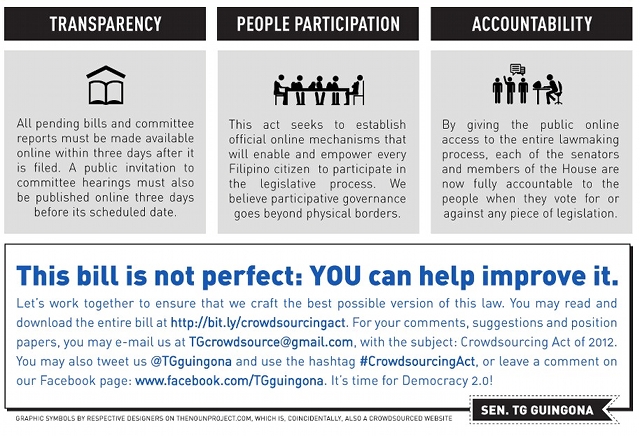SUMMARY
This is AI generated summarization, which may have errors. For context, always refer to the full article.

MANILA, Philippines – Will the Philippines soon have laws that are products of netizens’ inputs and participation?
Sen Teofisto “TG” Guingona III hopes so as he files the Crowdsourcing Act of 2013 for the 16th Congress.
The bill allows social media users to participate in the lawmaking process, from the filing of the bill, through the initial public consultations, the debates, and before the bill’s approval.
The Crowdsourcing Act lets netizens comment on pending bills through e-mail and the Internet, and gives them access to copies of bills pending before the Senate and the House of Representatives.
It also lets people reach lawmakers during the period of interpellations and debates. Guingona said people’s views at this stage “will serve as vital guidance for the senators and congresspersons to make their final vote on pending measures.”
Guingona first filed the bill in October 2012, soliciting suggestions via e-mail and social media to improve the measure.
In a statement on Thursday, July 4, the senator said the measure will protect people’s right to “effective and reasonable participation at all levels of social, political, and economic decision-making.”
“Crowdsourcing is an expression of the belief that despite our geographical separation, people can still participate in national affairs through the borderless world of the internet,” Guingona said.
Guingona was the lone senator who voted against the controversial Cybercrime Prevention Act of 2012, which netizens, human rights groups and media organizations questioned before the Supreme Court.
READ: Cybercrime law: Demonizing technology
The petitioners asked the High Court to strike down the law, saying it gave the government too much power over netizens, and suppressed freedom of expression and freedom of speech.
The Court stopped the implementation of the law and has yet to rule on its constitutionality.
While the Crowdsourcing Act is still a proposed measure, Sen Miriam Defensor Santiago has said that her Magna Carta for Philippine Internet Freedom (MCPIF) will become the first law to be created through crowdsourcing if passed.
The senator said a group of concerned netizens approached her office with a draft of the measure, formulating it through discussions on Facebook, e-mail, Google Hangout conferences, and social media sites like Twitter.
The MCPIF aims to establish a framework for information and communication technology (ICT) in the Philippines, and to repeal the anti-cybercrime law.
‘Participate in budget process, too’
Besides the crowdsourcing bill, Guingona has also refiled a bill seeking greater participation, this time in the budget process.
In a statement on Wednesday, Guingona said the Civil Society Organizations’ Participation in the National Budget Process Act establishes consultation and feedback mechanisms to promote the participation of civil society groups in crafting the annual budget.
Under the bill, accredited civil society organizations (CSOs) through their authorized representatives will be allowed to participate as resource persons in budget hearings of committees in both houses of Congress.
Guingona said the committees will schedule one hearing day for the CSOs to present their positions on the budget. The senator first filed the bill in 2010.
“Civil society organizations are a crucial resource, constituency and partner of the government in advancing sustainable human development, and transparency and accountability in government process,” Guingona said.
“It is high time we encourage non-governmental organizations and people’s organizations to focus their effort on the national budget, which is the primary economic and political tool of the government,” he added.
Guingona said if passed, the bill will institutionalize legislature-civil society collaboration for a “people-oriented budget.”
READ: Slides and ladders: Understand the budget process
VISIT Rappler’s #Budgetwatch microsite – Rappler.com
Add a comment
How does this make you feel?
There are no comments yet. Add your comment to start the conversation.